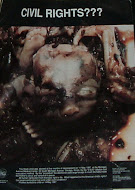Euthanasia and Murder
There is no law against a man biting off his own nose, unless it be a law of nature; nor even any police regulation against his hanging himself up by the hair or whiskers to talk to his friends and family in greater discomfort. There are penalties for suicide but, though I have no suicidal habits myself, I fancy they must be rather hard to apply; since they could only be sharpened into the legal and logical paradox of hanging a man to cure him of wanting to be hanged.
The majestic legislative mind of man does not commonly concentrate specially on forbidding things that nobody would normally want to do. Most probably, there never would have been any laws at all, except against things that men do quite naturally and even passionately want to do. Men punished murder precisely because there are such a large number of persons whom it would seem quite natural, and almost necessary, to murder. Men forbade theft because it is so utterly obvious that any fool could see it, that some property is in the wrong hands, and that anybody might think it would be better applied in his own hands; any fool could see it, any fool could say it, and the law was made because any fool might do it. There was a third commandment, against stealing not only our neighbor's ass, but our neighbor's wife, on which it would now be indelicate to dwell, because all the fools have done it.
Now about this, the Modern Mind has passed through two stages, and I do not know which is worse; for the Modern Mind is rather a weak mind. In the nineteenth century, roughly speaking, all respectable people seemed to suppose that nobody could be tempted to murder or theft or adultery, if he was really respectable. They thought these temptations only came to a curious remote tribe of monsters, called the Criminal Class. We were solemnly told that every criminal must be a lunatic; when in fact there is hardly a healthy or sane man who gets through forty-eight hours without some temptation to commit some such crime.
Then suddenly the Modern Mind discovered this and (not being a very strong mind) instantly slumped into the opposite extreme. Like most moderately intelligent people, I read detective stories in preference to modern novels; but even in detective stories I find this queer rudimentary reason creeping up. Even in crime stories there is now some comprehension of crime; that is, of the fact that we are all criminals. And now the whole weakness is working the other way; many recent murder stories are actually justifications of murder. The moment a refined respectable gentleman realizes that he might want to kill somebody, he jumps to the conclusion that this person ought to be killed. The fact that Aunt Jane is obviously a nuisance, that Uncle William is becoming a terrible bore, that Cousin Hildebrand stands between us and the really sensible family solution, is beginning to look more and more like a real reason for doing them in. That is why, in my own country, some are proposing what is called Euthanasia; at present only a proposal for killing those who are a nuisance to themselves; but soon to be applied progressively to those who are a nuisance to other people. As it applies by hypothesis to an almost moribund or partially paralyzed person, the decision will presumably rest with the other people.
It all began, of course, with stealing our neighbor's wife as well as his ass; because she was more of an ass than the ass. If we want to know how this allowance for exception ruins or replaces the rule, the best example is divorce. Those who first urged it, urged it quite honestly as an extreme exception. They did really mean to apply it only to somebody married to a homicidal maniac. It has come to mean that a leading literary man told me on a platform in New York that no man could remain married to a woman who said, "Right-O." I thought he might have avoided being married to a woman who said, "Right-O." It has come to the point when a man advertises his desire to be divorced from a woman, only because he has forgotten her name. How jolly it will be when the sanctity of human life has reached the same stage as the sanctity of marriage! When men do not even remember whom they have murdered, as this gentleman could not remember whom he had married. Is it not time we reasserted the principle, known to primitive men, that the things we desire to do are the things we may be restrained in doing; and it is because we are all criminals that we had better be discouraged from crime?
(From The American Review, Feb. 1937)



































0 comments:
Post a Comment